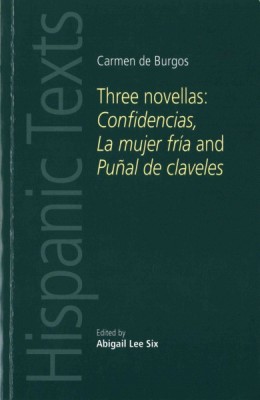| Carmen de Burgos: Three Novellas: Confidencias, La Mujer Fría and Puñal de Claveles Contributor(s): Lee Six, Abigail (Editor) |
|
 |
ISBN: 0719097118 ISBN-13: 9780719097119 Publisher: Manchester University Press OUR PRICE: $20.85 Product Type: Paperback - Other Formats Published: January 2016 |
| Additional Information |
| BISAC Categories: - Literary Criticism | European - Spanish & Portuguese - Literary Criticism | Comparative Literature - Social Science | Women's Studies |
| Dewey: 863.62 |
| LCCN: 2020455816 |
| Series: Hispanic Texts |
| Physical Information: 0.36" H x 5.06" W x 7.81" (0.38 lbs) 168 pages |
| Themes: - Sex & Gender - Feminine |
| Descriptions, Reviews, Etc. |
| Publisher Description: This is a scholarly edition of three stories by Carmen de Burgos (1867-1932), including the unabridged texts, vocabulary, notes, chronology, bibliography, 'temas de debate y discusión', and a critical introduction. De Burgos, also known by her pen-name of 'Colombine', was an influential journalist, socio-political activist, and a key literary figure in the cultural ferment of pre-war Madrid. She is currently being rediscovered, having languished in a long and regrettable oblivion during the Franco years. Confidencias (1920) is the fictional diary of a young married woman, describing her first adulterous relationship and exploiting the narratological possibilities of the diary form. La mujer fría (1922) is a vampire story featuring perhaps the very first pitiable vampire, or at least one of the earliest examples of this type, whilst ingeniously maintaining undecidability as to whether the protagonist is supernatural. Puñal de claveles (1931) narrates a wedding-day elopement and was inspired by a news item, the so-called 'Crimen de Níjar' of 1928. Federico García Lorca drew on de Burgos's story and the real-life crime for his Bodas de sangre, but while his play is tragic, Puñal is bathed in a golden glow of nostalgia for the author's native Andalusia and ends optimistically. As well as making accessible three individually interesting and entertaining stories, this book offers a varied selection, with some of the issues closest to Colombine's heart tackled from different perspectives, but adding up to a coherent critique of marriage conventions, women's poor education, and prevailing ideals of femininity. |